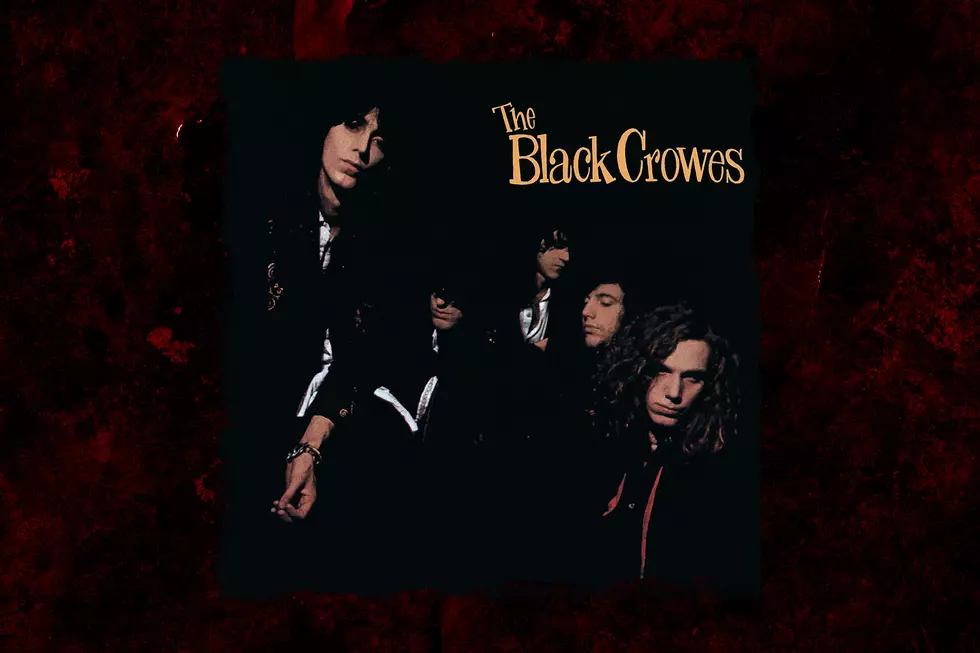
32 Years Ago: The Black Crowes Shake Up the Rock World on ‘Shake Your Money Maker’
It was the turn of the decade and the rock world needed something fresh to break through the glut of highly produced hair metal / hard rock that was flooding the airwaves. Though grunge would eventually be the force to overturn rock radio as we knew it a year later, The Black Crowes eventually became the breakout band in 1990 that started to show there was finally a fresh appetizer on the menu.
This strong five-piece rock band emerged as a force with their debut album, Shake Your Money Maker — a record that embraced early era rock's soulful R&B influences while bringing back a Rolling Stones-esque swagger for a new generation.
The group started six years earlier with brothers Chris and Rich Robinson forming Mr. Crowe's Garden in 1984 while still teenagers. The group went through a series of other members in the years leading up to settling on a lineup that would eventually playing on Money Maker and the changes didn't stop after the album was recorded. Guitarist Jeff Cease played on the record, but eventually gave way to Marc Ford who would handle duties on their second record. Johnny Colt played bass on four albums, while drummer Steve Gorman was the other constant through the band's entire first era prior to their 2019 reunion.
The early years provided some challenges with a still underage Rich Robinson having to hide out in the car at times before being allowed to come into clubs to play the shows. But eventually George Drakoulias, a staffer at Rick Rubin's Def American label, caught the group playing a New York show and was so impressed that he not only helped to get them their label deal with Def American, he also stepped in to produce Shake Your Money Maker.
Splitting time between Atlanta's Soundscape Studios and three different studios in Los Angeles, the now newly renamed Black Crowes laid out their bluesy yet Southern rock inspired record throughout the course of 1989. Speaking of the name change, Chris Robinson told Q Magazine, "We were really into the Dream Syndicate, the Rain Parade, Green on Red — all those Paisley Underground bands, so we wanted a psychedelic name. When we changed, we kept the Crowes because that's what people called us anyway."
The sessions also provided some stellar assistance, with The Allman Brothers' Chuck Leavell helping out on piano and organ, noted backing singer Laura Creamer helping to accentuate some of the record's chicken skin-raising moments and a young engineer named Brendan O'Brien chipping in on "a potpourri of instruments."
The Shake Your Money Maker album arrived Feb. 13, 1990, but it wasn't an instant hit. "Jealous Again" was the first song released from the record, but it didn't catch fire immediately. Though the song's muscular opening riffs and killer piano backing are fan favorites now, it was a slow build until the track eventually climbed to No. 5 on the Mainstream Rock Tracks chart and enjoyed a bit of crossover hitting No. 75 on Billboard's Hot 100.
However, people did take notice, picking out influences ranging from '70s-era Rolling Stones to making their Georgia connection to Southern Rock roots. “What Southern rock became is not what the Allmans started out to be. They were creating a new Southern sound. And what we do now is what I’d like Southern rock to become," Chris Robinson told Rolling Stone, adding, “But there is a lot of the South in us. I don’t know exactly what it is. Maybe it’s just that we’re a little closer to the ground. We have no pretensions about what we do. We’re just a little earthier. We do things a little slower, more casual.”
Black Crowes, "Jealous Again"
The second single, a cover of Otis Redding's soul classic "Hard to Handle," was the song that helped the group really start to see things take off. Drakoulias in an interview with the Atlanta Journal Constitution recalled pushing for a cover on the record. "I thought we should do a cover (on the album), and I think Chris came up with 'Hard to Handle.' I think he was kind of reluctant to doing Otis (Redding) and I said, 'We’ll make it into a rock thing.' I was reading the review (of the album) in Spin magazine and they quoted the song and said, 'Pure poetry from Chris Robinson.' (Laughs) We had an opportunity to expose kids to Otis and this amazing song and put this music out in the world."
Indeed, "Hard to Handle" was a rocked up version of the Otis original — an easily memorable guitar line, an undeniable beat and Robinson's hoarse but swagger-filled delivery that made listeners want to heed the calling of the album's title. The song topped the Mainstream Rock Tracks chart and became their first Top 40 hit climbing to No. 26 on the Hot 100.
Black Crowes, "Hard to Handle"
Keeping the rocking momentum going, "Twice as Hard" came next. The bluesy bend of the guitars and Chris Robinson's powerful belting provided more of an anthemic track for the band. Though not as big as its predecessor, "Twice as Hard" would hit No. 11 on the Mainstream Rock Tracks Chart and would be the last harder rocking single from the record.
The Black Crowes, "Twice as Hard"
While Black Crowes were starting to hit their stride with the listening audience, there were some critical of the group mining familiar territory, but that didn't bother Chris Robinson any.
“What is original?" the singer remarked to Rolling Stone. “I’m not going to bang two badger carcasses together and recite poetry and say, ‘Hey, here’s the new thing.’ We sing a traditional type of music in a very untraditional way. It’s country music, and blues and R&B and other things. It’s ethnic music. That’s what we do.”
Still, after a trio of bluesy rock bangers to make listeners stand up and take notice, the group showed their softer side, digging into their teen years output and finally sharing the acoustic guitar-leaning and soulful "She Talks to Angels" with the masses.
While the song deals with a darker theme of drug use, it was penned during a period when the Robinson brothers had yet to really experiment with their future excesses. "'She Talks to Angels' is about a girl I kind of knew in Atlanta who was a goth girl who was into heroin, so I made up a story about what if that was your girl," said Chris Robinson in their 2010 Croweology video series. "I didn’t really know about that stuff except from afar at that time, which is probably why that song has a sincere relationship to a dark subject.”
Indeed the song was able to connect. The video became an MTV hit and song inspired many fans to sing along to the heartfelt aches dripping from Robinson's voice. "She Talks to Angels" became their second chart-topper on the Mainstream Rock Tracks chart, hit No. 30 on Billboard's Hot 100 and opened the door for the band to a lot of new avenues, especially with acoustic "unplugged"-type material really finding popularity at the time.
Black Crowes, "She Talks to Angels"
The band would release one more single, the heartbreak-inducing "Seeing Things" before concluding their radio promotion, but in all honesty they could've gone even further down the rabbit hole with killer tracks such as "Sister Luck" and "Could I've Been So Blind" still remaining favorites in the catalog despite never being issued as singles.
By the time all was said and done, Shake Your Money Maker had hit No. 4 on the Billboard 200 Album Chart, but more importantly, it had provided a different voice in the rock world.
“Sometimes I feel like we’re carrying the flag,” Chris Robinson declared in a 1991 Rolling Stone interview. ”One part of it is, we were in the right place at the right time for our thing. But here’s a band that people check out on MTV or in Rolling Stone and realize: ‘Yeah, they say what they really wanna say and play what they really wanna. What a novel concept! That rock 'n' roll can be interesting and feel good and be a real living, breathing animal ... Then again, maybe it’s just that we play some songs and people like ’em.”
In the years since its release, Shake Your Money Maker has been certified five times platinum, so yeah, people "liked 'em."
Top 90 Hard Rock + Metal Albums of the '90s
More From 94.9 WMMQ










